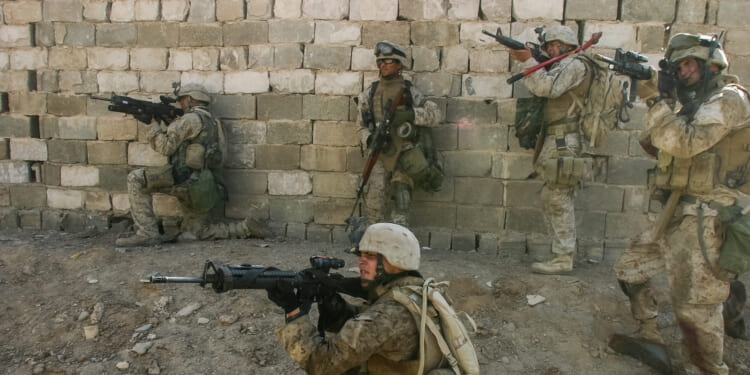“We can roll them up and finish this in a day.”
It was April of 2004 and a combined Marine-Army force had fought its way into Fallujah, a major city in Anbar province as well as a stronghold of an insurgency composed of Iraqi and foreign jihadists and remnants of the defeated Baathist regime.
The U.S. Marines did what they were asked to do. Cliche? Well, who else does even that much?
Marine Lt. Col. Bryan McCoy relayed his operations officer’s assessment to the hierarchy in Baghdad, less than 100 miles to the east, notably Ambassador Paul Bremer and Ali Allawi, respectively head of the Coalition Provisional and prime minister in Iraq’s transitional government.
Their response, the military analyst and retired Marine colonel Bing West says in Michael Pack’s new film, The Last Six Hundred Meters, was: “stop right where you are. You don’t have permission to carry this battle any further.”
The film does not mention whether the same policy makers who had ordered the Marines to take the city back from insurgents, then ordered them not to, remembered that General James Mattis had told them only weeks earlier that seizing the city was unnecessary because Special Forces could enter the city and capture or kill the persons responsible for the lynching of American contractors only a few weeks earlier.
The latest policy was for Americans to guard the areas around Fallujah while a newly trained and equipped Iraqi force, the Fallujah Brigade, would secure the city.
In August Marines squelched a Shiite insurgency in the southern city of Najaf (aided by the intervention of a prestigious religious leader, Grand Ayatollah Ali Sistani). In the meantime, the Fallujah Brigade flopped.
In November, the Marines were ordered to seize Fallujah.
Washington Post correspondent Thomas Ricks, who was reporting from Iraq, told Michael Pack:
It [the events, orders, and counter orders over the spring and summer] was the first time, I think, that a lot of American officials really realized this thing was going very badly. That, despite the happy talk out of the Bush administration and out of Ambassador Bremer, that Iraq was a much more troubled place than they realized. I remember thinking, “I thought this was bad. I hadn’t thought it was gonna be this bad.
The engagements in Fallujah and Najaf are the settings for Mr. Pack’s The Last Six Hundred Meters, which will be shown tonight on PBS and subsequently streamed. The 20-year delay to release the 90-minute film was due to someone’s opinion at the television channel that it was “too pro-military.”
Viewers can decide whether a searing, gripping testimony to a few good men able to distinguish between right and wrong in the fog of war and under the smog of contradictory policy is “pro-military” p.r. or something more akin to the ancient epics to manly virtue.
The Second Fallujah campaign, November and December 2004, was the lengthiest by U.S forces in the Iraq war and the Marines’ biggest urban battle since the 1968 battle for Hue. Marine combat correspondent Jan Bender supplied the footage for the campaign.
3/1 (3rd/First) Marine commander, Lt Col. Willy Buhl explains:
The plan was to clear from the north, from the high population concentrated areas, push them to the south, which was generally more open terrain … an area we could apply our combined arms with more effect.
Post-campaign interviews, none later than 2007, interspersed with Cpl. Bender’s film footage, frame the action with plot and theme: will endurance and devotion enable the Marines to succeed in their mission while protecting one another? The answer appears through Cpl. Bender’s lens.
This is no “first draft of history”; it is history, undamaged by partial first drafts or biased later ones. And like all history, it is a story: good guys, bad guys, heroes, supporting characters, clueless or wise.
The Last 600 Meters weaves perilous filming, thoughtful interviewing, and skillful editing to a true story out of what might otherwise be remembered as an example of muddled policy. There is no sign of Mr. Pack’s hand, though it must have been everywhere. The same can be said of the work of Cpl. Bender (also one of the interviewees), who is as determined to let the camera do its work under his unflinching but quiet guidance as Mr Pack is to let the interviewees’ words relate the human meaning of what happened.
There is no political commentary unless you count understated, if blunt, remarks on what occurred. Large questions on our post-9/11 strategy are unavoidable, but only after the film ends and the lights are turned on. The film is about American fighting men staying cool in the most difficult job with devotion and skill. Marines pulling their wounded back over his protests. A rifleman calmly securing his grip over a broken wall.
Each frame expresses the words of M/Sgt. Karl Erickson: “Foreign policy I don’t make. I give you the last 600 meters.”
They are the 600 meters when the best give their all. Overblown as this sounds, it is fact. The combat correspondent’s dual role is what makes us see this. Cpl. Jan Bender is a Marine, therefore an infantry rifleman. He goes into battle with his rifle strung across his chest, his camera attached by a parachute cord so that he can drop it and raise his rifle in a single fluid motion.
Cpl. Garrett Slawatycki and his squad are seen in one of the nerve-wracking maneuvers they must execute, again and again, to flush out an enemy who hides behind civilians; the marines’ movement and teamwork as they break into homes is so rehearsed it functions by reflex.
Cpl. Slawatycki:
For us, it was clear the building, and then worry about the next one. Clear the building, and the next one, and the next one, and then hundreds and thousands of ‘em after, and the millions of rooms that you end up walking into.
Cpl. Jan Bender recollects:
First day’s kind of a blur. I mean, we ran — you’re just on pure adrenaline, waitin’ for that house. You know, every house is a potential death trap. And you know, you always take a deep sigh after the door you take is cleared, and truthfully, I didn’t run that much video on the first day. I was all about being on the trigger, you know.
“On the trigger”; but on the video too. Ruthless toward the enemy, tender toward their own, every heart beating for the others. Cpl. Mathew Piano is shot in the head. The squad thinks, as Cpl. Bender says, he must be a goner, but
he walked out of there. And you know, Tycki will tell you he kept repeating things like, “Tycki, you got the squad,” you know, he’s — he’s trying to — he knows he’s gone, he knows he’s out of the fight, but he wants — he wants us to be successful.
“Tycki” — Cpl. Slawatycki — puts it this way:
I looked at it more like, you know, you just gotta do what you gotta do to help your friends, you know, to help your fellow Marines…. I wasn’t worried about, you know, getting shot … I was, I was worried about the guys to my left and right.
Cpl. Piano remembers:
What I was very upset with and I still regret it to this day was — I don’t know about other wounded Marines, but if you get wounded you feel as if you failed. You are trained not to get wounded. It’s just a failure, you feel like a failure. I feel I let my Marines down.
He did no such thing, and he gave the foreign policy makers their 600 meters. Did the policy makers keep them? History will decide, but the story remains. In the meantime, we know the terrorists returned, then the Iraqi government applied authority off and on; by then most Americans had lost interest.
There is literature on Fallujah, maybe more than one would expect. And maybe historians will study it and suggest answers to the film viewers’ questions. What did we think we could accomplish in Mesopotamia, in the first years of the 21st century? The U.S. Marines did what they were asked to do. Cliche? Well, who else does even that much?
Lt. Col. Nicholas Buhl:
They’re asking after their buddies. That’s all they’re asking. “How is.… How is Kasal?” “How’s Nicol doing?” That’s all they ever asked. “Do I have to leave? Do I have to be medivaced?” “You’re going to be okay, and yes, doc says you’ve got to go. We’ll see you. We’ll see you, you know, as soon as you get better.” You always want to reassure these men that they’ve done their duty and [pauses to get a grip, I didn’t think I’d have a problem here.] You always want to reassure them and you want to try to do that before they get their medication so they remember it because that memory is seared into their, into their soul. They, they never forget it. None of us do.
READ MORE from Roger Kaplan:
Give (Eternal?) Peace a Chance?


![Scott Bessent Explains The Big Picture Everyone is Missing During the Shutdown [WATCH]](https://www.right2024.com/wp-content/uploads/2025/11/Scott-Bessent-Explains-The-Big-Picture-Everyone-is-Missing-During-350x250.jpg)













